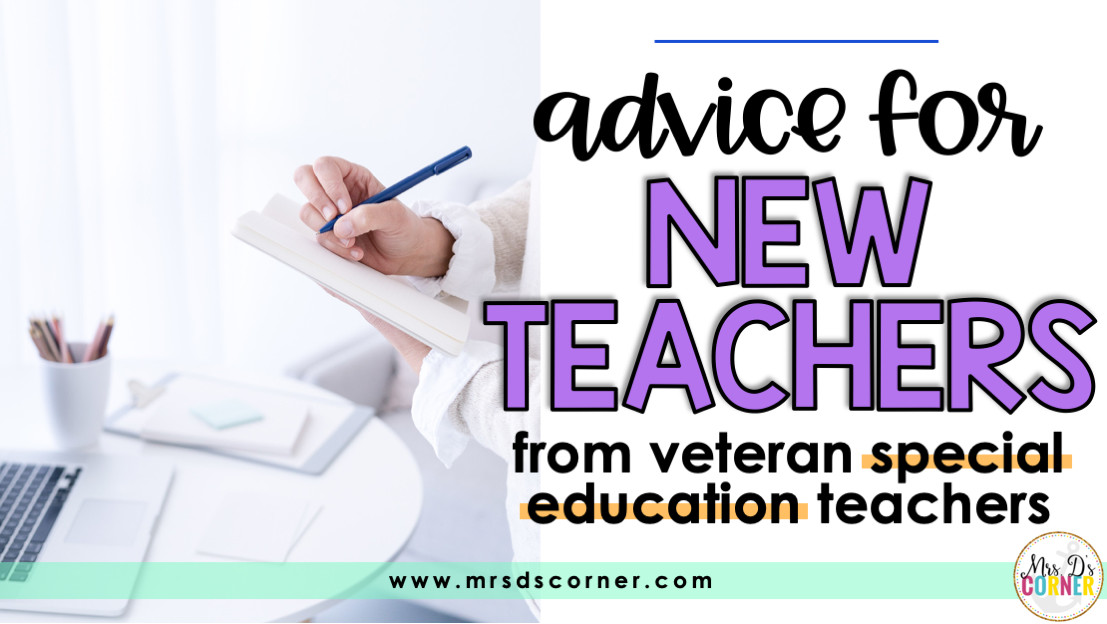They say hindsight is 20/20, and that holds true in teaching as well. What you know now is
vastly different from what you knew when you first started teaching. So, what advice would you
give your first-year teacher self?


We asked veteran teachers to share their best advice for new teachers and the advice they wish
they had gotten during their first year. You can read their original responses here in our group,
Mrs. D’s VIPs, when joining our online community. Check out the compilation of ideas and
suggestions below!
Advice for First-Year Elementary Teachers
Take Time for You
Focus on learning how to balance home life and work as best as you can. Realize it is a constant
struggle and one that you will likely grapple with for your entire teaching career, but it does get
better. Make sure that you treat yourself as kindly as you would treat others and do not be
afraid to set boundaries on your time and energy.
Don’t Expect Others to Do What You Will Not
When you start teaching alongside a paraprofessional, it is important to make sure that you are
showing that you are a team player. That means that everything you expect them to do, you
must also do. If you leave the “dirty work” for your paras and refuse to do it yourself,
resentment will build, and your working relationship will deteriorate. Be willing to get your
hands dirty!
Celebrate the Small Wins
First-year teaching is hard! Make a conscious effort to celebrate the small wins instead of
focusing on the negatives. There will be stress, there will be struggles, but there is always
something to be thankful for every day.


Do the Things That Must Be Done First
With so many things to coordinate, plan for, and implement, teaching can be very distracting.
Start each day by making a list of the things that absolutely must be done for that day and
tackle them first. After they are completed, move on to the things you would like to do. This
alleviates the stress of not getting to the things that need to be done and frees up your mental
load.
Build Relationships First
The most important thing in your classroom is not the decor or the way the desks are set up. The most important thing is your relationship with your students. Focus on building great rapport, trust, and respect before diving headfirst into the curriculum. Your students need to know that your classroom is a safe space and the only way to do that is by building relationships that reflect that.
Just as important is building relationships with your students’ parents and families. They need to know that you are on their child’s side and want the very best for them. Building those strong relationships before you ever get to an IEP meeting makes the entire process less stressful for you and for them.
They Have to Know What You Want Them to Do In Order to Do It
It makes sense that students need to know what behaviors are expected before they can
display them. Still, many first-year teachers make the mistake of jumping into learning before
teaching their students what they expect in terms of behavior and procedures. Spend the first
weeks of school explicitly teaching and modeling the behavior you want so that students can
successfully display it. Kids want to do the right thing; you just need to teach them what that
means for your classroom.
Keep a Copy of All Documentation
Before filing away the documentation on a student’s progress, make a copy! Sometimes documentation and data get misfiled and go missing, so backup copies are helpful. Not only will they make writing IEPs easier, but they’re also helpful in justifying placements and intervention strategies.
Have an IEP Writing Timeline
Don’t just wing it and hope that you’ll remember everything when it comes to the steps to writing an IEP and holding an IEP meeting. The IEP Meeting Toolkit is a great resource for organizing your time, coming up with a plan, and staying on track for all of your students’ IEPs.
Maslow Before Bloom
Students’ basic needs must be met before they can work on their educational goals. Focus on Maslow before Bloom.
Start Planning for Retirement from Day One
Special education is a physically, mentally, and emotionally taxing profession. Start planning for your retirement from the first day of teaching so that you have options should your health need you to step away from the classroom.
Make Friends with the Custodians
Custodians will be your best friends in special ed. They help clean and straighten classrooms and can be your biggest supporters when your room needs something extra.
Don’t Dismiss Parents’ Concerns and Input
We mentioned building good relationships with parents above, but part of that is validating their concerns and input. Don’t dismiss what they’re seeing or telling you about their child. They know their child best and it’s important to work with them.
Read and Understand the Law
When was the last time you read and studied the IDEA, ADA, Section 504 of ADA, and ESSA? Take time to study them before you get in the classroom. Your job and your students’ success depends on you knowing what they are and how they impact your special education classroom.
Be Flexible But Consistent
Your students need a teacher, not a friend. Be flexible in meeting their needs and adapting to the ever-changing schedules that happen in schools, but be consistent in your expectations and routine. Your students look to you for stability and that can’t happen if you’re their friend. Remember that you are the adult in the room.
If you are a first-year teacher, what are you struggling with in the classroom? Join our group
and get support from veteran teachers! We will help you navigate this crazy first year of
teaching!

